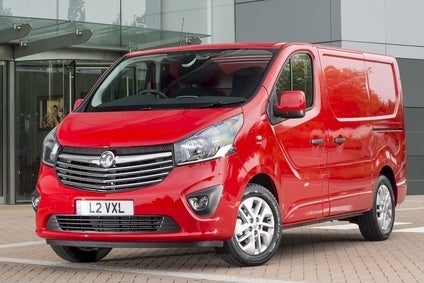
General Motors Europe’s Vauxhall plant at Luton is planning a second Vivaro van shift at its Luton plant, adding 400 jobs.
The Financial Times said the additional shift would boost plant output from 45,000 now to 67,000 a year.

Discover B2B Marketing That Performs
Combine business intelligence and editorial excellence to reach engaged professionals across 36 leading media platforms.
The automaker expects ‘great demand’ for the newly redesigned Vivaro van which it sells as a Vauxhall in the UK and Opel in Europe.
According to the FT, GM has targeted an 8% slice of the European car and van market by 2020 and has made Luton its only dedicated commercial vehicle plant in the region.
A second shift would see 60% of the plant’s output exported compared with just over 50% now.
Higher than expected demand, or a decision to export to new markets, such as Russia, could see the factory move to a three-shift operation, FT sources said.
The paper noted that Luton, which has built Vauxhall vehicles for 100 years, beat off competition from Renault’s factory in Sandouville, Normandy, to [gain a share of the build] of the new Vivaro, which [like the outgoing model line] was developed by GM and the French carmaker.
“Renault were trying to eat our lunch, and the competitive proposition of this factory staved that off,” Vauxhall managing director Tim Tozer told the Financial Times. “This is all about business sense and efficiency. GM is not a charity.”
Opel and Vauxhall-badged vehicles will be produced on long and short-wheelbase form and equipped with a 1.6-litre diesel engine in single or twin turbo form and in four power configurations. It will share pressings with the sister plant at Sandouville which will also supply the UK with high roof versions of the new Vivaro.
Vivaro production has kept the Luton plant going for the past 12 years. Following a joint venture with Isuzu of Japan which produced the Frontera 4×4, Vauxhall since has made LCVs with JV partner Renault.
In a statement, Vauxhall said production of the new Vivaro required a GBP185m spend including GBP76m in manufacturing facilities and GBP90m in vendor tooling and special equipment. The automaker claimed the project “secures 1,200 jobs”.
Luton is now the UK’s only light commercial vehicle manufacturing plant [after Ford shut its Southampton Transit plant last year] and exports to 27 European markets.
The plant is significant contributor to the local and national economies building nearly am Vivaro vans since 2001 including 44,000 vans built in 2013. The factory is a major exporter with 52 per cent of production destined for European markets.
Suppliers will also benefit from GBP600m of new business over the life of the new Vivaro with 40% of content sourced locally from UK suppliers. This is up by 60% on the current van.
“The booming British automotive industry is now big enough to encourage a much larger supply base,” said purchasing and logistics director Mark Poulton.
“Local content benefits UK PLC as well as making sound business sense, giving added flexibility and reducing our carbon footprint.”
New suppliers include: International Automotive Components, Coleshill, West Midlands (carpets); Tenneco-Walker, Gwent (exhausts); Shape Corp, Coventry (front cross member); TI Group Automotive, Deeside (fuel tanks); Mitsumi Electro, Hayes, Middlesex (GPS antenna) and Kautex Textron, Hengoed, Mid Glomorgan (wash tanks and hoses).
Dunstable-based Magna Seating now produces seats solely for Vauxhall after Ford’s Southampton plant shut last year.
Employing 53 people and mirroring shift patterns with the Luton van plant, Magna makes single front seats, double front seats and rear seats for the new van on a new production line. On average Magna makes over 118,000 seats per year or 506 per day.
Milton Keynes-based MKP makes 12 parts including various cross members and bulkhead panels.
A family owned business with 200 employees, 58% of its customers are first tier automotive manufacturers including Aston Martin, Bentley and Lotus.
The Luton plant built 44,000 vehicles last year.
(headlineauto contributed)






